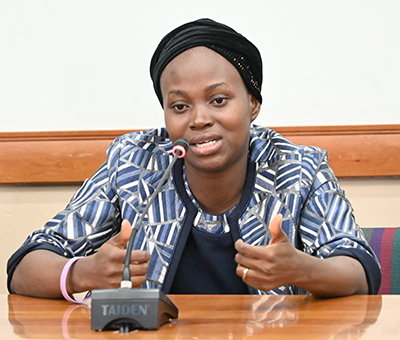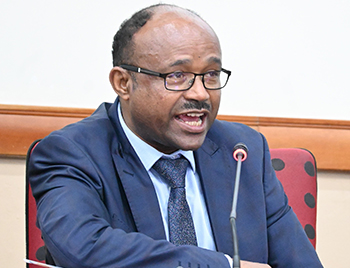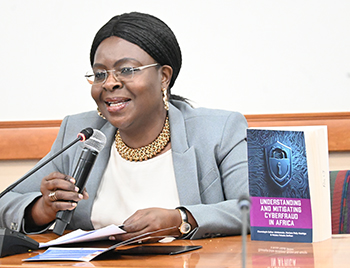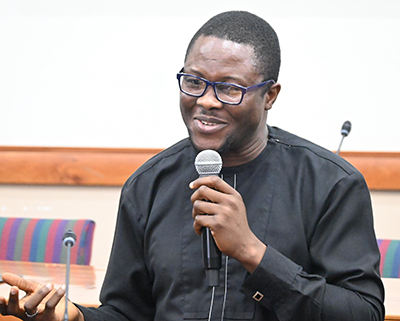About six weeks after obtaining her second doctoral degree from the University of Bath, UK, early in 2024, Prof Polly Mashigo, Executive Dean of the Faculty of Economics and Finance, teamed up with the Head of Department of Economics, Prof Mulatu Zerihun, National Research Foundation (NRF) C2-rated researcher and Dr Esther Akinbowale, Postdoctoral Research Fellow at the Department of Economics. The authors embarked on writing an inspirational and highly relevant book titled “Understanding and Mitigating cyberfraud in Africa”. Cyberfraud is a critical topic which poses major threats not only to the African continent but globally.
On 11 November, the book was launched during the Faculty of Economics and Finance’s Symposium, which focused on ‘Economic Growth Dynamics in Post-Apartheid South Africa – challenges and prospects”.
In her welcome note, Dr Vatishwa Papu-Zamxaka, Deputy Vice-Chancellor for Research, Innovation and Engagement, highlighted the relevance of the topic in view of the constantly increasing cybercrime, the importance of informing and educating society on issues such as cyberfraud and -crime has become crucial. “The time is now and now is the time,” she said.
Speaking about her second doctoral journey and writing a book so soon afterwards, Prof Polly Mashigo, who was one of only twenty-seven (27) candidates rigorously selected from the twenty-six South African universities to undertake the part-time Doctoral Programme, said: “The Doctor of Business Administration in Higher Education Management (DBA:HEM) combines a very precise research base with professional development in higher education policy and management, both globally and in specific settings. It places a high priority on the beneficial transfer of knowledge to professional practice. It was an exhausting journey. When my two fellow co-authors approached me to help write the book, I did not think I had enough energy left to do so. For some reason, they managed to convince me and when I looked at the topic, I realised the absolute need for a book on this critical topic, especially because of the increasing trends of cyberfraud and -crime on the African continent and the world at large.”

Dr Esther Akinbowale, Postdoctoral Research Fellow at the Department of Economics and co-author of the book.
In his review of the book, Northwest University-based, Prof Olalekan David, indicated that the book puts the spotlight on the consequences of cybercrime on African economies and highlighted important statistics on the prevalence of these crimes.
“In South Africa:
- 70% of the population had fallen victim to cybercrime and other risky behaviours, compared to 50% globally;
- 47% of Smartphone users had experienced mobile cybercrime in the part 12 months, compared to 38% globally:
- Cybercrime has an economic impact equal to 0,14% of the National GDP, about R5,8 billion a year. The cost to the global economy is $445 a year.”
He added that this is a must-read book, which covers a wide range of topics, from a general overview of fraud, global statistics, the experience of different African countries of cyberfraud incidences, to case studies, and analysis of cybercrime activities in South Africa and the management control systems (MCSs), to practical guideline for mitigating cyberfraud and a discussion on policy lessons and formulation.

Head of Department of Economics, Prof Mulatu Zerihun, National Research Foundation (NRF) C2-rated researcher and co-author of the book.
Providing context on his involvement as co-author, Prof Zerihun explained that financial inclusion is one of the topics covered in the Department of Economics’ Research Niche Area, “Inclusive Growth, Socioeconomic Development and Development”. Although it would be ideal for people to buy the book, Prof Zerihun added that it is an Open-Source book as well. This will enable the information to be accessible to many more South Africans.
My journey towards obtaining a second Doctoral qualification from University of Bath, UK – Prof Mashigo
Following the book launch, Prof Mashigo shared more information about her second Doctoral qualification.
Summarising the study titled, “Assessment of Co-operative Governance in a Post-1994 Democratic South African Higher Education Sector”, Prof Mashigo explained that the South African pre-1994 apartheid era subjected higher education to political, cultural, and social inequalities and discrimination that were differentiated and diversified based on race, gender, class, ethnicity and spatial nature. The post-1994 democratic era prompted the government to adopt co-operative governance model in the higher education sector to redress the past apartheid challenges.
The main objective of this study was to assess how co-operative governance finds expression in South Africa’s post-1994 democratic higher education sector to erode the apartheid legacy. The study further explored the nature, claims and expectations for democracy as reflected in higher education co-operative governance policy frameworks. Co-operative governance, with its principles of institutional autonomy, academic freedom and public accountability, was assessed to determine how it is framed in higher education policy to achieve democracy.
“Starting and completing a Doctoral qualification of this magnitude, especially for managers and leaders of universities who are inundated with administrative and other research-related responsibilities daily, was a daunting task. There are challenges that you are certain to face during the study. Some of these include the feeling of isolation, having to work alone with little time for social interaction, compounded by increased levels of stress, conflict with the study supervisors at times as well as difficulty in managing time between work, home and family.
"The experience gained through my first Doctoral degree prepared me for the level of detail and amount of research and writing that would be expected of me. Staying positive, motivated, and focused, helped me make it to the finish line. This also taught me the resilience and ability to plan for and complete this book,” she added.
Programme Overview - Doctor of Business Administration in Higher Education Management (DBA: HEM)
The programme, funded by the South African Department of Higher Education and Training (DHET), is aimed at the reflective, career-minded professional manager who is looking for a systematic research programme that prioritises developing management expertise. Since it attracts higher education managers globally, emphasis is placed on learning through shared experience. It involves key issues in contemporary higher education management and prepares candidates to exercise professional responsibility and leadership in areas of strategic planning, decision-making and organisational change.

Prof Polly Mashigo, Executive Dean of the Faculty of Economics and Finance, speaking about their book and her second doctoral degree.
Candidates should have the potential to achieve organisational change within their organisations, or the higher education sector in general. They are generally required to have held a mid- to senior position of responsibility in the field for at least three years. The qualification brings together professional service managers, ‘third space’ professionals and academic staff from across the world to learn from each other in the university of Bath’s DBA in Higher Education Management (HEM) and to look outside their institutional and cultural mindsets to make our universities better places to work and study. This led the way in forging an international academic community for the exchange of ideas through globalisation, internationalisation, and the knowledge economy.

Northwest University-based, Prof Olalekan David who reviewed the book.
